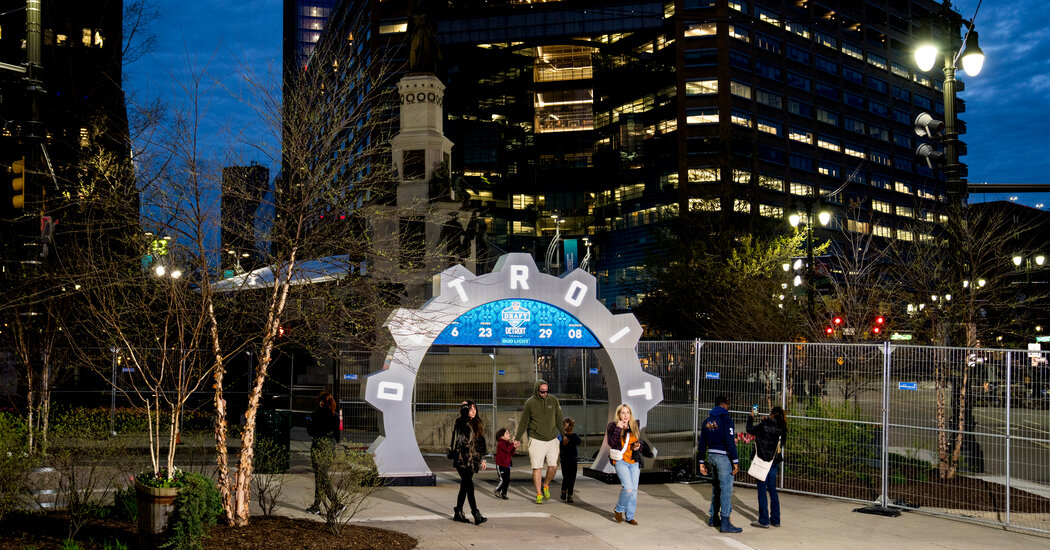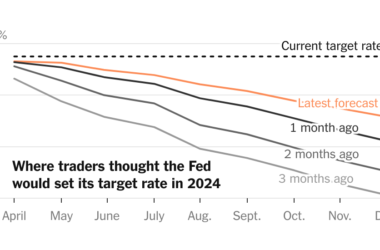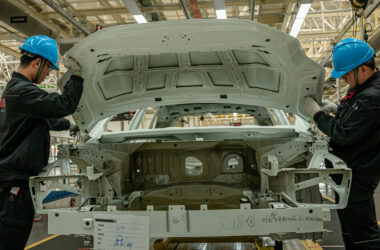When the N.F.L. took its college draft on the road a decade ago, its first stops were Chicago, Philadelphia and Dallas, three of the league’s biggest markets.
The concept was an instant hit, turning a show cloistered for a half century in hotels and theaters in Manhattan into a free, three-day football festival that drew hundreds of thousands of fans, many driving long distances to attend.
Soon, more than a dozen cities were raising their hands to host the event. Unlike the N.F.L.’s marquee event, the Super Bowl, the draft does not require extensive public subsidies, hotels and security. It is also held in late April, when weather is less of a concern, even in cities with harsh winters. This allowed the N.F.L. in recent years to award the draft to Cleveland, Kansas City, Mo., and other cities that have never, and may never, host a Super Bowl.
Detroit hosted the Super Bowl in 2006, as a reward to the Lions for moving into a new stadium. But city officials expect that being the site of this year’s draft, which begins on Thursday, will provide an economic jolt, though how much of one is unclear. They also hope the three days of exposure on television showcases the city to fans who might not otherwise visit. Detroit, they say, is not the Detroit of a decade ago, when the city was bankrupt, tens of thousands of homes had been abandoned and the automobile industry was pulling out of a long slump. Since then, new hotels, businesses and residents have flooded downtown; unemployment has fallen; and the city’s debt has returned to investment grade.
“We have a chance to reintroduce ourselves to America,” Detroit’s mayor, Mike Duggan, said in an interview. “The last time this country paid any attention to us was 10 years ago when we were in bankruptcy. We haven’t had anything of this magnitude in a long time. We’re just looking to greet America and give our visitors a good experience.”
The draft as movable feast started partly out of necessity. Radio City Music Hall, which hosted nine consecutive drafts dating to 2006, had a scheduling conflict in 2015, so the N.F.L. moved the event to Chicago. The draft that fans watched on television, with top college players walking onstage when their names were called, was held in a theater on Michigan Avenue. The real surprise was across the street in Grant Park, where 200,000 fans from around the region attended what amounted to a pop-up N.F.L. theme park.
The mix of team colors and the family-friendly vibe was proof of concept for the N.F.L., which created a process for other cities to apply to host the event. Teams and civic leaders in their markets raised their hands, seeing the event as a kind of football Woodstock that attracts lots of visitors. In 2016, Rod Wood, the president of the Lions, began lobbying the league to bring the draft to Detroit. The next year, the Lions and the Detroit Sports Commission applied, but were passed over as the draft traveled to cities like Nashville and Las Vegas. Detroit was finally tapped in 2022 to host this year’s event.
Like other cities, Detroit worked with the N.F.L. to find a location that met the league’s requirements for issues like security and transportation. The N.F.L. chose Campus Martius Park downtown and a four-block stretch on Woodward Avenue leading to the Detroit River for the stage and fan zone. To fuel businesses outside that narrow footprint, the Downtown Detroit Partnership created fan viewing sites in nearby parks. Block associations in the Corktown, Greektown and Eastern Market neighborhoods will host their own viewing parties.
Bob Roberts, the president of the Corktown Business Association, runs McShane’s, a sports bar in the area. He said he expected to triple his normal sales during the draft. Visitors, he said, can visit a market for local artisans and the Detroit Police Athletic League down the street, where the N.F.L. is hosting activities for youngsters. The association will run shuttles to nearby parking facilities and the draft site downtown.
“It’s going to be a huge shot in the arm,” Roberts said. “We expect that we’re going to be busy from the time we open until the time we close.”
The Michigan Black Business Alliance used the draft to persuade small, minority-owned businesses to register to work at big events. Britney Hoskins, who runs the Top Pic Collective, which rents chairs, tables and other furnishings, said that after she was certified, the N.F.L. selected her company to outfit V.I.P. rooms, a beer tent and other areas. Having the league on her résumé, she said, is validation that she hopes will help her win other business after the draft has left town.
“We’ve never been in the room before,” Hoskins said. “We are on all of these major-scale event radars now, so to me the impact is long lasting.”
Cities and tourism bureaus often promote the economic benefits of hosting large events like the draft. The Kansas City Sports Commission, for instance, said the event generated $164 million last year. Most sports economists, though, dismiss these estimates as manufactured to suit agencies trying to justify the use of taxpayer funds to host events for for-profit organizations like the N.F.L. The estimates often fail to account for expenses like police overtime and road closures, or the money raised by host committees from sponsors and local corporations.
Jordan Kobritz, who teaches sports management at the State University of New York at Cortland and has owned and operated minor league baseball teams, is skeptical of the projections, but said publicity from the event could be a positive, even if it was ultimately intangible.
“There is benefit at the end of the day because one thing that is very hard to analyze is the publicity that the community gets out it,” he said. “Look at where Detroit is. True or not, there is a public perception that downtown is a disaster area. They’re hoping that all this positive publicity will help attract people who want to live there or do business there.”
Detroit has not created any estimates on the potential boon in part because no one is sure how many people will show up and from where. Detroit is within a five-hour drive of six N.F.L. markets and just across the Detroit River from Canada. Officials hope the recent success of the hometown Lions and the University of Michigan’s football team, which won the national championship this year, will boost local attendance. But the weather and other factors can affect whether fans arrive from out of town.
“That’s the thing: When it’s not necessarily a ticketed event, how many people are going to show up?” said Dave Beachnau, executive director of the Detroit Sports Commission.
After the draft ends, a ceremonial football will travel to Muskegon, Mich.; board the Lake Express ferry; cross Lake Michigan to Milwaukee; and then head north to the site of next year’s draft, Green Bay, the smallest N.F.L. market but a singular one.
“I have a feeling people will make the pilgrimage” next spring, said Gabrielle Dow, vice president of marketing for the Green Bay Packers. “You’ll get to see your favorite team’s picks and check the box of seeing Lambeau Field. You’ll kill two birds with one stone here.”



